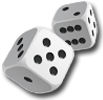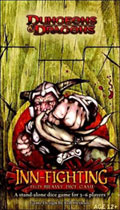



play board games
Board game reviews, strategy tips & session reports
Inn-fighting Review
 Stats:
Stats:
No. of players: 3-6
Amount of time to play: 30 min
Age requirements: 12+
Set-up time: 5 min
Inn-fighting Rules Description:
Inn-fighting is a light-filler dice game that will appeal to many fantasy and DnD fans. Produced by Wizards of the Coast and based on DnD, the game has you playing an adventurer in the middle of a bar fight. You can punch your opponents and hit them with chairs or use a special attack that is themed to your character-type.
To start the game you are dealt two Action cards and one Adventurer card. Place your Adventurer in front of you and look at the Action cards. If either Action card is a Bystander they are placed next to your Adventurer. You will need poker chips or something use as hit points. Place poker chips equal to the Adventurer or Bystander’s hit points in front of their card.
To start each round every player rolls a d20. The highest roller wins initiative and goes first that round. Play continues clock-wise after that.
On your turn you roll the six Brawl dice. Punches strike the player on your left while chairs strike the player to the right. Power symbols allow you to hit the player with the most victory points (VPs). Having multiples of any of these symbols allows you to attack the player’s Adventurer. Rolling only one of the symbols against a player with a Bystander forces you to target the Bystander. You must choose which one attack you will make based on what symbols you rolled.
After declaring the attack you roll a d20 and add the number of dice you rolled with the attack type. (ex: Making a punch attack after rolling 3 punch symbols adds 3 to your attack roll.) Each character has a Skill value and lists a Low and High damage value for each attack type. If your total is equal to or greater than your Skill you do the High damage. If it is less than your Skill you do the Low value. Rolling a 1 automatically misses and a 20 adds 1 to your damage.
If you ever do 3 or more damage or land a hit that will knock an Adventurer or Bystander out your opponent gets to roll the defense die. Different characters have different defenses with different results. But if you hit you take chips from their hits points and place them in your VP pile in front of you. Knocking out an Adventurer gets you a VP bonus and Bystanders are worth 2VP when you knock them out.
If your Adventurer is knocked out, fear not. You can simply reenter the fight on your next turn by taking the top card off the Adventurer deck. You also get another Action card at this time. If your Bystander is knocked out they simply go to the Action card discard pile.
There are two other symbols on the dice, luck and ale. If you roll these symbols they are passed to the next player and NOT rolled. On your turn if you accumulate three luck symbols you get another Action card. Three or more ale symbols and you are able to heal your adventurer.
The Action cards allow you to break these basic rules or are Bystanders that may give you other bonuses.
The first player the get 20VP and damage an opponent’s Adventurer on their turn wins the game.
A Quick Review of Inn-fighting:
If I said this game wasn’t fun, I’d be lying, but if I said it was super good I’d be lying too. First off the rules are horribly written. Wizards released an FAQ that helped but it is still annoying just how bad the rules are. Secondly for light the game is it is a bit fiddly. There is a good amount to keep track of and if you are playing with someone not familiar with DnD the learning curve is a little steeper. There is also little balance as some Adventurers are more powerful than others. The beholder in particular can be crazy and annoying to play against. In a game the other night I won with him on the first turn.
But like I said above Inn-fighting is still fun to play. The clichés of the Adventurers and Bystanders are whimsical and funny. The art is equally good and most fantasy geeks will enjoy playing it. Just be sure your friends know what the game is, a light, random, dice-game.
Score and synopsis: (Click here for an explanation of these review categories.)
Strategy 2 out of 6
Luck 5 out of 6
Player Interaction 4 out of 6
Replay Value 3 out of 6
Complexity 3 out of 6
Fun 4 out of 6
Overall 3 out of 6

Leave a Reply